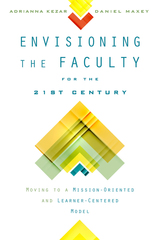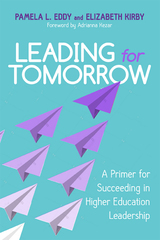2 books by Kezar, Adrianna

Envisioning the Faculty for the Twenty-First Century
Moving to a Mission-Oriented and Learner-Centered Model
Kezar, Adrianna
Rutgers University Press, 2016
The institution of tenure—once a cornerstone of American colleges and universities—is rapidly eroding. Today, the majority of faculty positions are part-time or limited-term appointments, a radical change that has resulted more from circumstance than from thoughtful planning. As colleges and universities evolve to meet the changing demands of society, how might their leaders design viable alternative faculty models for the future?
Envisioning the Faculty for the Twenty-First Century weighs the concerns of university administrators, professors, adjuncts, and students in order to critically assess emerging faculty models and offer informed policy recommendations. Cognizant of the financial pressures that have led many universities to favor short-term faculty contracts, higher education experts Adrianna Kezar and Daniel Maxey assemble a top-notch roster of contributors to investigate whether there are ways to modify the existing system or promote new faculty models. They suggest how colleges and universities might rethink their procedures for faculty development, hiring, scheduling, and evaluation in order to maintain a campus environment that still fosters faculty service and student-centered learning.
Even as it asks urgent questions about how to retain the best elements of American higher education, Envisioning the Faculty for the Twenty-First Century also examines the opportunities that systemic changes might create. Ultimately, it provides some starting points for how colleges and universities might best respond to the rapidly evolving needs of an increasingly global society.
[more]

Leading for Tomorrow
A Primer for Succeeding in Higher Education Leadership
Pamela L. Eddy
Rutgers University Press, 2020
When faculty climb the ranks into leadership positions, they come with years of knowledge and experience, yet they are often blindsided by the delicate interpersonal situations and political minefields they must now navigate as university administrators. What are the specific skills that faculty need to acquire when they move into administrative positions, and how can they build upon their existing abilities to excel in these roles? What skills can other mid-level leaders learn to help in their positions?
Using an engaging case study approach, Leading for Tomorrow provides readers with real-world examples that will help them reflect on their own management and communication styles. It also shows newly minted administrators how they can follow best practices while still developing a style of leadership that is authentic and uniquely their own.
The book’s case studies offer practical solutions for how to deal with emerging trends and persistent problems in the field of higher education, from decreasing state funding to political controversies on campus. Leading for Tomorrow gives readers the tools they need to get the best out of their team, manage conflicts, support student success, and instill a campus culture of innovation that will meet tomorrow’s challenges.
Using an engaging case study approach, Leading for Tomorrow provides readers with real-world examples that will help them reflect on their own management and communication styles. It also shows newly minted administrators how they can follow best practices while still developing a style of leadership that is authentic and uniquely their own.
The book’s case studies offer practical solutions for how to deal with emerging trends and persistent problems in the field of higher education, from decreasing state funding to political controversies on campus. Leading for Tomorrow gives readers the tools they need to get the best out of their team, manage conflicts, support student success, and instill a campus culture of innovation that will meet tomorrow’s challenges.
[more]
READERS
Browse our collection.
PUBLISHERS
See BiblioVault's publisher services.
STUDENT SERVICES
Files for college accessibility offices.
UChicago Accessibility Resources
home | accessibility | search | about | contact us
BiblioVault ® 2001 - 2024
The University of Chicago Press









